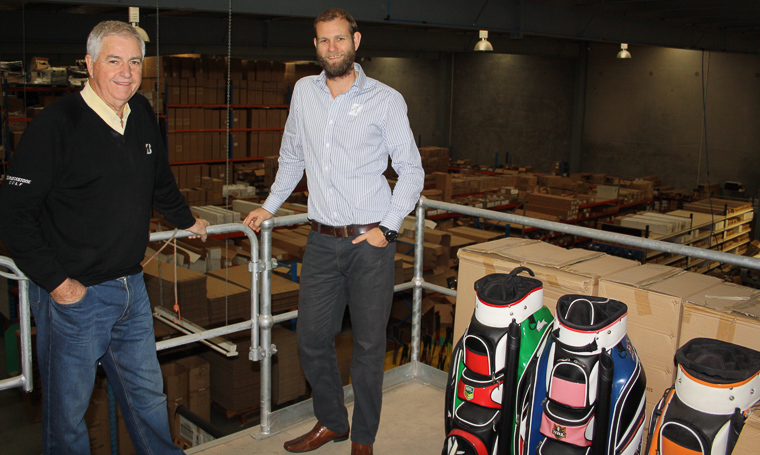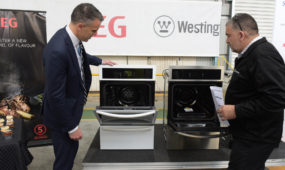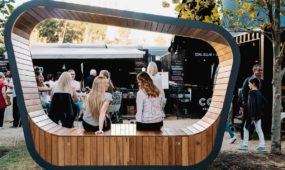Golf boom drives sales for Dynacast Group
Manufacturing
A pandemic-induced golf boom has a small South Australian company on track to record its strongest financial year in recent memory.

Sign up to receive notifications about new stories in this category.
Thank you for subscribing to story notifications.

Based in Adelaide, South Australia, Dynacast Golf’s last heyday was in the 1980s and ‘90s when the global success of Greg Norman drove the sport’s boom in Australia.
But after a series of lean years and a number of distribution deals with global brands such as Garmin and Bridgestone, the company is again on top of its game as golf enjoys another resurgence.
“Between us and pushbikes we’ve been at the forefront of what can be done (during the pandemic) so we’ve been incredibly fortunate and we’ve just got to ride it while we can,” Dynacast Group general manager Daniel Rowe said.
Golf courses stayed open in South Australia and in most Australian states throughout the coronavirus pandemic, despite most other sports closing down for at least part of the time.
Rowe said just as he was about to introduce reduced working hours for the company’s staff after a slow March and April at the height of the pandemic last year, the phones started ringing.
“May started picking up and from then onwards it just went nuts,” he said.
“A lot of the local clubs were offering things like COVID memberships over winter when they were traditionally a bit quiet and it absolutely boomed.
“There were a lot more social players coming back to golf and those who were playing were all of a sudden playing a lot more.”
Dynacast became the Australian wholesaler and distributor for Garmin Golf GPS devices in 2011.
It became a distributor for KBS golf shafts in 2012 and an assembly centre and distributor for Bridgestone Golf in 2014. It is the only place in the world outside of Japan and the United States attested to assemble Bridgestone clubs, which it makes for the Australian and New Zealand markets.
“Particularly the Garmin watches that have heart rate monitors and can track your walk, those sales went through the roof,” Rowe said.
“The next thing we found was the (Bridgestone) golf balls started moving again and then the hardware side picked up as well.
“We cover everything from the entry-level golf market with the Dynacast gear to the premium end of the market with Bridgestone and we found that everything picked up.

“We’ve probably sold all the odd stuff we’ve had out in the warehouse for years and the reality is just the sheer volume of product going out the door is going to make for a fantastic 12 months.”
Golf Australia reported that 42,000 new members joined golf clubs in the 10 months to October last year – the best result since 1989.
In a further report in March, it found that the number of official rounds played in Australia over the summer months reached 2.89 million, up 12 per cent on the 2.58 million played in the same three months the previous summer.
However, Rowe said the boom had started to extend to other countries as their economies began opening back up, leading to difficulties in obtaining stock.
“We started ordering pretty heavily early, which has been fantastic for us because there are shortages everywhere at the moment,” he said.
“Globally, every supplier you speak to has got all this extra demand and on top of that there all of these shortages of raw materials – there are rubber shortages for golf balls, steel shortages for shafts, alloy and titanium shortages for golf clubs and the factories have hit capacity.”
“The only unfortunate part about it is that if my crystal ball wasn’t on the fritz at the start of all this, we could have had a whole lot more product and be in a whole different position.
“Even at the moment we’ve had to fly in some club heads just to fill some back orders.”
Dynacast also specialises in the niche area of mini-golf, supplying putters and other equipment to courses around Australia.
Rowe said although it only accounted for a small part of Dynacast’s business, the popularity of mini golf was also on the rise and had been partly fuelled by the popularity of TV show Holey Moley in February and March.
Dynacast Golf has been assembling golf clubs south of Adelaide since Rowe’s father Eric took over a small golf shop called Yankalilla Golf Factory in 1983.
One of Australia’s biggest entry-level golf club brands in the 1980s and ’90s, Dynacast produced about 250,000 clubs a year and employed 15 full-time manufacturing staff.
Following the addition of the major brands’ distribution in recent years, its own assembly production has reduced to about 50,000 clubs a year with a staff of six working with a team of 10 reps on the road across Australia.
Rowe said he believed the current golf boom was far from over but the sport’s biggest challenge was whether the gains could be sustained long-term.
“The pandemic is not going away in a hurry so golf has got at least two years where these levels are going to stay up there.
“You are seeing clubs with membership waiting lists again and you are seeing a huge amount more social players.
“The real focus now has got to be on retaining those people and I think it’s possible.”
Jump to next article



